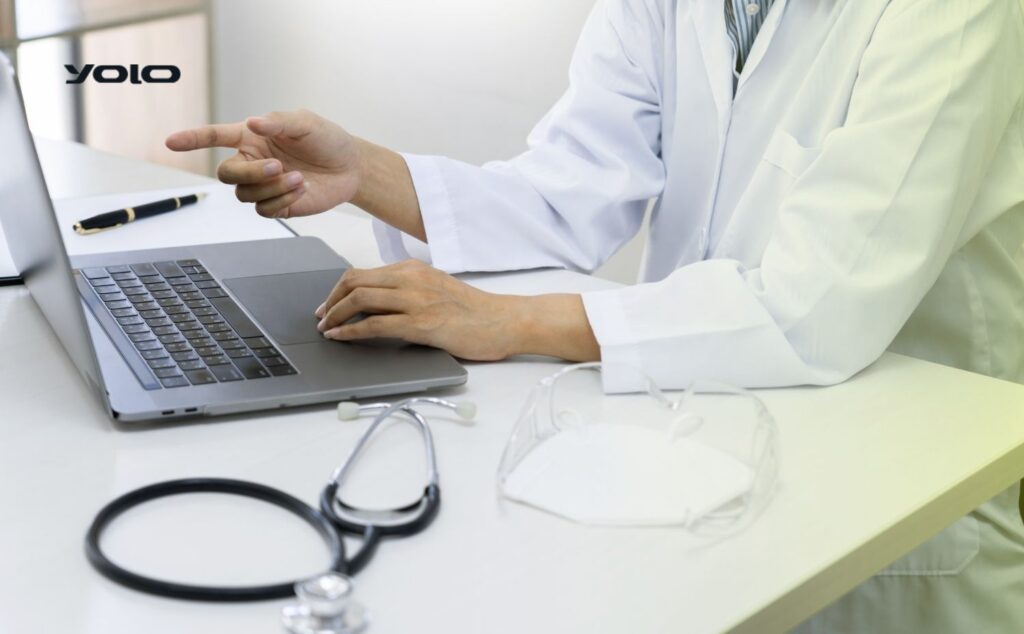During and after the COVID-19 pandemic, we’ve witnessed healthcare applications and telemedicine services revolutionize what was previously impossible, enabling everyone to communicate with doctors, obtain prescriptions, and order medications from pharmacies remotely, without having to leave home.
Today, we’re helping you take the next step in improving your healthcare services by offering smarter, more efficient ways to handle patient data… Through Medical Information Storage and Management For Telemedicine!

What is HDIMs?
HDIMs (Health Data Information Management System) refers to the organized system of handling health data in a digital format to organize, store, and manage health-related data in a secure and efficient way.
- For patients, it sends helpful reminders and notifications to ensure they never miss an appointment or medication.
- For healthcare providers, it allows instant access to patient data, improving diagnosis and treatment decisions while reducing errors.
- With secure encryption, HDIMs ensures that your health information stays private and protected.
In short, HDIMs makes managing health data easier, safer, and more efficient for everyone involved
Is Medical Information Storage and Management For Telemedicine… Useful?
Of course! Medical Information Storage and Management For Telemedicine is crucial because it eliminates paper records and manual entries, enabling caregivers to store, retrieve, and manage patient data securely and efficiently. Also:
- Improved efficiency: Faster access to patient records allows for more accurate diagnoses and more efficient and effective treatment decisions.
- Improved security: Digital systems provide encryption and security protocols to protect sensitive patient data.
- Patient convenience: Patients can easily access their records, book appointments, and receive reminders for upcoming medications or tests without having to visit the doctor’s office.
Yolo System | Clinic Management System
The UAE’s Only Clinic Management System with a 24-Hour Support Guarantee – Or Your Money Back!
What are the requirements for medical database?
For a medical database to be effective and compliant with healthcare standards, there are several requirements:
- Data Security: The database must use encryption to protect sensitive health information from unauthorized access.
- Scalability: It should be able to handle large amounts of data, especially as telemedicine services scale and more patients interact with healthcare providers.
- Compliance: The database must comply with privacy laws such as HIPAA (Health Insurance Portability and Accountability Act) in the U.S., GDPR in Europe, or other local data protection regulations.
- Real-Time Access: It should provide real-time access to patient data, enabling healthcare providers to make informed decisions quickly during consultations, whether in person or through telemedicine.
- Interoperability: The system should be able to integrate with other healthcare technologies, ensuring smooth communication across different platforms, such as diagnostic tools, electronic health records (EHR), and medical imaging systems.
What is the most common type of telemedicine?
Telemedicine encompasses various services that allow patients to consult with healthcare providers remotely, includes:
- Video Consultations: This is one of the most popular forms of telemedicine, where patients have face-to-face consultations with their doctors through video calls.
- Remote Patient Monitoring (RPM): Involves tracking a patient’s health data remotely using devices like blood pressure monitors, glucose monitors, or wearable fitness trackers.
- Store-and-Forward Telemedicine: This involves sending medical data (like images or lab results) to specialists for consultation at a later time, rather than in real-time.
- Telephone Consultations: For minor medical issues, patients can consult their doctors over the phone, providing a more accessible and quick option for care.

Can medical information be stored in the cloud?
Yes, telemedicine medical information storage and management often uses cloud storage solutions to store patient data due to its many important advantages, including:
- Scalability: As the number of patients increases, cloud systems can easily expand to accommodate more data without requiring significant investments in physical hardware.
- Accessibility: Cloud storage allows healthcare providers to access patient data from anywhere, facilitating care delivery, especially for telemedicine services.
- Cost-effectiveness: Cloud services often reduce the need for expensive on-site infrastructure, providing healthcare facilities with a more cost-effective solution for data storage and management.
However, cloud storage must be secured with strong encryption and comply with healthcare regulations such as HIPAA and the General Data Protection Regulation (GDPR) to ensure the privacy of patient data… ANd, This is where Yolo’s patient management systems excel!
Read more: Curious About Clinic Automation Software? Here’s YOLO!
How do medical systems ensure that data is stored securely?
Ensuring the security of medical data is critical in any healthcare setting, especially in telemedicine.. so, medical systems usually use numerous safeguards protocols to save data, for example:
- Encryption: Medical systems use strong encryption techniques to protect data during transmission and storage, making it unreadable to unauthorized individuals.
- Access Control: Strict user access controls are enforced to ensure only authorized personnel can access sensitive medical data.
- Regular Audits: Healthcare organizations perform regular audits to monitor who accesses patient data and ensure there are no security breaches.
- Backup and Disaster Recovery: Data is regularly backed up, and disaster recovery protocols are in place to prevent data loss in case of system failures.
These measures, combined with ongoing security updates, ensure that patient information is safe and compliant with legal regulations.
Does medical data storage comply with privacy laws such as HIPAA and GDPR?
Yes, Medical Information Storage and Management For Telemedicine is designed to comply with privacy laws such as HIPAA (for U.S. healthcare providers) and GDPR (for those operating in Europe). These laws are essential for maintaining patient confidentiality and ensuring that healthcare organizations handle personal data responsibly.
- HIPAA Compliance: Requires healthcare providers to implement security measures like encryption, secure access controls, and regular audits to protect patient data.
- GDPR Compliance: Mandates that healthcare providers give patients more control over their data, including the ability to request access, correction, or deletion of their medical records.
Telemedicine platforms that comply with these laws (like YOLO does) ensure that patient data is stored, accessed, and transmitted in a secure manner, protecting both the patients and the healthcare providers.
Is medical data easily accessible during telehealth sessions?
Yes, Medical Information Storage and Management For Telemedicine ensures easy access to medical data during telemedicine sessions, as this has important features for patients as well as for the caregiver, for example:
- Improved Diagnosis: Doctors can make informed decisions by accessing up-to-date patient data in real-time.
- Enhanced Patient Care: Healthcare providers can tailor treatment plans based on the comprehensive information available during telemedicine sessions.
- Reduced Errors: Instant access to complete patient information helps minimize medical errors caused by incomplete or outdated records.
- Quality assurance and continuing education: By reviewing recorded sessions, healthcare providers can self-assess, analyze their communication skills, and identify areas for improvement.
- Huge potential for advancing medical research and clinical studies: With appropriate patient consent and privacy assurances, anonymized recorded sessions can be used for research purposes, allowing researchers to gain insights into patient behavior, treatment effectiveness, and healthcare outcomes.
Read more: Patient Management System UAE | Efficient Healthcare Solutions
Why is it important to invest in personal computers, internet storage devices, and input/output devices for the hospital?
Investing in personal computers, internet storage devices, and input/output devices is critical for hospitals, especially when it comes to Medical Information Storage and Management For Telemedicine. The reason is:
- Efficient data management: Personal computers and input/output devices help healthcare providers manage and access patient data efficiently, which is critical for telemedicine services.
- Improved connectivity: Internet storage devices and high-speed internet ensure healthcare providers can seamlessly access and share patient data during telemedicine consultations.
- Improved collaboration: Hospitals need reliable devices for remote collaboration with other healthcare providers, specialists, and patients, making these devices essential for effective telemedicine.
- Data security: Investing in high-quality devices ensures that patient data is stored, transmitted, and accessed securely in accordance with privacy laws and best practices.
With these devices, hospitals can ensure efficient data management, seamless communication, and improved collaboration, all while maintaining strict data security standards.
Make the Switch to YOLO for Effortless Telemedicine Management
Ready to simplify how you manage patient data and telemedicine appointments? YOLO’s platform makes it easy to store and access medical information securely, enhancing your practice’s efficiency and patient care.
